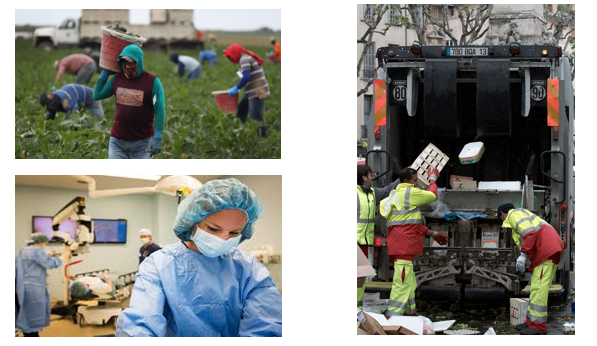Current developments and trends of CSR in the United States
2020-09-16GoldenBeeCarolyn Schmidt0

Carolyn Schmidt
Program Director, ECOLOGIA (NGO – USA) Secretary,
ISO 26000 Stakeholders Global Network
ISO 26000 Stakeholders Global Network
There is a phrase in the English language, to say that something is “the elephant in the room”.
All the people in the room know that the elephant is there, and could hurt them. The point is, they have been ignoring the problem, and pretending it does not exist. And if and when they finally acknowledge the elephant’s presence, will they do anything meaningful about it?
In the United States today, one of the “elephants in the room” is COVID-19. The US was slow to acknowledge COVID-19’s presence or deal with its challenge. Consequently, it is testing our institutions and adding urgency and uncertainty to every decision that businesses make.
COVID-19 has exposed many “fault lines” and unsolved problems in our society. Living through these stresses is the daily challenge. But, most relevant to this gathering, is that businesses are now under pressure to act with Social Responsibility, in this time of crisis.
All the people in the room know that the elephant is there, and could hurt them. The point is, they have been ignoring the problem, and pretending it does not exist. And if and when they finally acknowledge the elephant’s presence, will they do anything meaningful about it?
In the United States today, one of the “elephants in the room” is COVID-19. The US was slow to acknowledge COVID-19’s presence or deal with its challenge. Consequently, it is testing our institutions and adding urgency and uncertainty to every decision that businesses make.
COVID-19 has exposed many “fault lines” and unsolved problems in our society. Living through these stresses is the daily challenge. But, most relevant to this gathering, is that businesses are now under pressure to act with Social Responsibility, in this time of crisis.

CSR trends showed from the corporate culture evolution in US
The changes in American corporate culture since the 20th century have reflected the development trend of CSR in US. In 1925, President Coolidge articulated his vision for the United States. A quotation taken from that speech, “the business of America is business”, was used for almost a century to justify making business profitability, at any cost, the nation’s highest priority.
However, the full text of the speech shows that, in fact, Coolidge was advocating for moral and social values that are more important than the profit motive on its own:
“The chief business of the American people is business. Americans make no concealment of the fact that we want wealth, but there are many other things we want much more. We want peace and honor and charity which is so strong an element of all civilization….
“Of course the accumulation of wealth cannot be justified as the chief end of existence. But we are compelled to recognize it as a means to well-nigh every desirable achievement. So long as wealth is the means and not the end, we need not greatly fear it….But it calls for additional effort to avoid even the appearance of the evil of selfishness.”
The wording of this speech is important on two levels.
On the one hand, Coolidge anticipated a framework for socially responsible businesses, quite similar to that emerging in multi-stakeholder international standards today.
On the other hand, the popular distortion of his vision and its reduction to “the business of America is business” reveals a dominant cultural mind-set insisting that every other aspect of society should take second-place to business profits.
In 1970, Nobel Prize winning American economist Milton Friedman amplified the distortion of Coolidge’s vision. He asserted that “the social responsibility of business is to increase its profits.” He further argued that any business expenditure that did not directly increase shareholder profits was not a legitimate business expense.
This idea reflected and strengthened mainstream thinking in corporate America, and dominated MBA programs. CEOs feared being sued by stockholders if they spent money on socially responsible or philanthropic activities. For decades, this culture of fear and hesitation continued to be an obstacle to the implementation of CSR principles in the United States.
But now there was an elephant in the room that businesses had not wanted to recognize: the environment.
The first Earth Day in 1970 marked the beginning of a societal challenge to the notion that US government and business should make decisions with business profit as the only priority.
American businesses took small steps in the 1970s and 1980s to begin integrating social and environmental considerations in their operations. They often (not always) complied with new laws and regulations. But they continued to believe that it was necessary to justify any socially or environmentally beneficial action by the “business case”.
CSR had to serve the bottom line of profit. CSR was completely voluntary.
In the 1990s and into the 21st century, CSR started to become an important part of national and global regulatory systems. Some countries, such as Denmark, started to require it. And in 2010, ISO 26000, the first – and still unique – global voluntary standard for social responsibility was successfully negotiated through a multi-stakeholder process. We might see this as the beginning of a global consensus on the core principles of SR.
However, in the US, even with the revelations of the financial crisis of 2008-2009, publicly traded corporations continued the single-minded pursuit of profits. CEOs were paid huge bonuses for keeping stock prices (shareholder value) artificially high by buying back shares, and even faking performance data.
This once again reignited the debate about CSR, and energized the public discussion about the role companies should play in America society.
Consequently, since 2010, there has been a growth of new types of corporate entities in the US, such as Benefit Corporations, that seek a legal standing to operate within a broad CSR framework rather than the “business case”.
Just a year ago, in August 2019, CEOs of 181 America’s largest corporations signed a well-publicized Business Roundtable document. This stated a commitment to run their companies for the benefit of workers and communities, as well as for shareholders.
Discussion of two topics will highlight current CSR trends in the US
The two topics facing American society at the moment also reflect people's cognition and expectations of CSR. One is people's thinking about essential workers in the context of COVID-19, and the second is the boycott of Facebook.

COVID-19 arrived in the US about half a year ago, and the world of business as usual is being turned upside down. Flaws in the privatized health care system, the lack of a social safety net, inadequate wages for workers – all are now into the foreground.
Acknowledgment of the injustice and suffering related to unequal distribution of resources has led to some cash payments by the federal government to individuals and families, and grants and loans to businesses to encourage them to stay open.
A new term has entered our everyday vocabulary: “essential workers”. Essential workers perform vital daily services in health care, food harvesting and preparation, maintenance, trash collection, and trucking and delivery of products. COVID-19 has increased public awareness of the importance of the people who do the routine, often dangerous and physically demanding jobs that everyone else depends on. They are essential workers, front-line workers, and at-risk workers.
In the US, essential workers are often the lowest paid. They work long hours, and are the least secure, often with no health insurance or sick days. Until the COVID-19 crisis, they often received little social respect. Now, in mainstream media, there are sympathetic articles, photos and interviews with people who are “essential workers”, showing their humanity and the conditions they struggle with daily, usually with good humor and a sense of commitment. Chinese organizations also provide supports.
COVID-19 wage increases, especially for these essential workers, have accompanied expressions of respect and appreciation for them. Employers that have humane workplace policies and who pay decent wages to these workers are getting credit. Large corporations in particular are under pressure to show they are using their resources to help out.
Those who have mistreated their workers are openly criticized. For example, one major hotel chain, whose CEO had signed the Business Roundtable CSR statement, laid off most of its “essential workers” while paying out large dividends and announcing a raise for its CEO.
Increasingly, US corporations are being held accountable when they act contrary to the basic understandings of CSR, that corporate earnings should be shared with stakeholders such as essential workers.
This understanding may seem obvious to you as members of the Chinese CSR community. However, I can assure you that it is a huge, tectonic shift in attitudes expressed by the majority of Americans.
Another example of rising expectations of business responsibility in the United States is the advertisers’ boycott of Facebook during July 2020. The “elephant in the computer” here is the power of social media, and its capacity for harm when not used responsibly.

Facebook is the dominant global social media network. It had 2.6 billion monthly active users in 2019, with over $70 billion in revenue and 8 million advertisers. 98% of its revenue is from advertising. Facebook’s business model is to sell advertisements which it then “places” on its website for targeted audiences, collecting vast amounts of data on each individual user, and types of users, to calculate the likelihood that an ad will appeal to them.
Outrage over the routine killings of unarmed Black Americans by white police officers was sparked most recently by the killing of George Floyd. The Facebook boycott grew directly from this outrage, and the spreading feelings among Americans of all races that “Black Lives Matter”. The boycott slogan, “Your profits will never be worth promoting hate, bigotry, racism, anti-semitism and violence” is saying that social stability and harmony between different races are too important and too fragile to allow the spread of deliberate lies designed to stir up violence. Social media, Facebook in particular, have been used for this purpose.
The Facebook boycott of July 2020 grew to include participation by 50 of its top 500 corporate advertisers, including Microsoft, Samsung, Wells Fargo, Honda, Ford, Adidas, BP and Unilever, and over 1,000 SMEs and SMOs in the US, Canada and Europe.
For Facebook itself, the significance of the boycott is not in a minor loss of revenue, but in the reputational and brand-name risk over the longer term. The greatest significance may well be the boycott’s role in the cultural shift in the US, toward more accountability of businesses for their impacts on society and the environment – in other words, pressure toward acting on the principles, core subjects and guidance of ISO 26000.
The American responses to these two current crises – COVID-19, and the uses of social media to promote hate – have one outstanding feature in common. In both cases, businesses are seen as an important part of the solution. American people are painfully coming to an awareness of how much we have to lose by fostering division and inequality, and the powerful positive role that socially responsible businesses have to play.
I have confidence that, in the long run, our major cultural shift will continue toward greater sense of responsibility for the vulnerable people in our own country, such as the “essential workers” and people of color, and to keeping up ties of friendship and mutual economic benefit with the nations of the rest of the world.
Best Practices
- The 100-year brand — Air Liquide also has a sense of juvenile
- Beijing Public Transportation Corporation: Developing green transportation to build a harmonious and livable capital
- CGN: Building a modern factory in barren deserts and developing a new win-win cooperation model along “Belt and Road”
Upcoming Event

All the materials on the site “Source: XXX (not from this site)” have been reprinted from other media. They do not imply the agreement by the site.
All the materials with “Source: CSR-China Website” are the copyright of CSR-China Website. None of them may be used in any form or by any means without permission from CSR-China Website.
GoldenBee Official WeChat
Copyright © Csr-china.net All Right Reserved.
京ICP备19010813号










